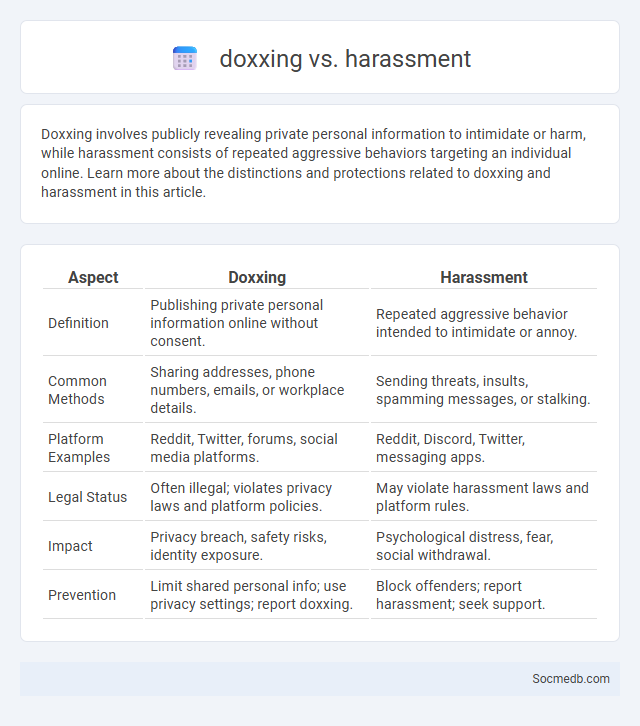
Photo illustration: doxxing vs harassment
Doxxing involves publicly revealing private personal information to intimidate or harm, while harassment consists of repeated aggressive behaviors targeting an individual online. Learn more about the distinctions and protections related to doxxing and harassment in this article.
Table of Comparison
| Aspect | Doxxing | Harassment |
|---|---|---|
| Definition | Publishing private personal information online without consent. | Repeated aggressive behavior intended to intimidate or annoy. |
| Common Methods | Sharing addresses, phone numbers, emails, or workplace details. | Sending threats, insults, spamming messages, or stalking. |
| Platform Examples | Reddit, Twitter, forums, social media platforms. | Reddit, Discord, Twitter, messaging apps. |
| Legal Status | Often illegal; violates privacy laws and platform policies. | May violate harassment laws and platform rules. |
| Impact | Privacy breach, safety risks, identity exposure. | Psychological distress, fear, social withdrawal. |
| Prevention | Limit shared personal info; use privacy settings; report doxxing. | Block offenders; report harassment; seek support. |
Understanding Doxxing: Definition and Scope
Doxxing involves the malicious act of publicly revealing someone's private information, such as home addresses, phone numbers, or financial details, without their consent. This invasive practice threatens your online privacy and safety by exposing sensitive data to potential harassment or identity theft. Awareness of doxxing's definition and scope is essential to protect yourself from its harmful consequences on social media platforms.
Harassment Online: What Sets It Apart?
Online harassment on social media platforms is characterized by persistent, targeted attacks that exploit the anonymity and reach of digital spaces. Unlike traditional bullying, it often involves a diverse range of tactics including doxxing, cyberstalking, and hate speech, making detection and prevention complex. The psychological impact is amplified by the public, permanent nature of online content and the rapid viral spread, posing unique challenges for victims and platform moderators.
Personal Information Doxxing: A Growing Concern
Personal information doxxing on social media is a growing concern as attackers increasingly target users by exposing sensitive data such as home addresses, phone numbers, and private emails. You must be vigilant about privacy settings and cautious about the information you share online to minimize the risk of doxxing. Platforms are implementing stronger protections, but user awareness remains crucial in preventing personal information leaks.
Comparing Doxxing and Online Harassment
Doxxing involves publicly sharing someone's private information without consent, posing serious risks to your safety and privacy. Online harassment includes repeated abusive behavior, threatening messages, and targeted attacks that can cause severe emotional distress. Understanding the differences between doxxing and online harassment helps you better protect yourself and navigate social media responsibly.
Legal Implications: Doxxing vs Harassment
Understanding the legal implications of social media activities requires distinguishing doxxing from harassment, as both involve privacy violations but differ in scope and intent. Doxxing refers to the unauthorized sharing of private personal information, often leading to real-world risks, while harassment includes persistent behavior intended to intimidate, threaten, or harm emotionally. Your awareness of these differences is crucial for navigating online interactions responsibly and safeguarding your digital rights.
Motivations Behind Doxxing and Harassment
Doxxing and harassment on social media often stem from motivations such as revenge, intimidation, or exerting control over the targeted individual. Perpetrators may seek to harm someone's reputation, invade privacy, or silence opposing viewpoints to gain a sense of power. Understanding these underlying reasons can help you develop strategies to protect yourself and navigate online interactions more safely.
Impact on Victims: Psychological and Social Effects
Social media significantly impacts victims by amplifying psychological distress, including anxiety, depression, and lowered self-esteem due to cyberbullying and online harassment. Prolonged exposure to negative comments and digital abuse can lead to social withdrawal, isolation, and difficulties in maintaining offline relationships. Studies reveal that victims often experience a decline in overall mental health, underscoring the need for effective digital support systems and victim protection policies.
Preventing Doxxing and Online Harassment
Implement robust privacy settings to minimize personal information exposure on social media platforms, significantly reducing the risk of doxxing. Utilize strong, unique passwords and enable two-factor authentication to protect accounts from unauthorized access and harassment. Encourage reporting and blocking of abusive users while promoting online communities committed to respectful and safe interactions.
Responding to Doxxing: Safety Measures
Responding to doxxing requires immediate action to protect personal information and maintain digital security. Victims should report the incident to platform administrators and law enforcement while using privacy settings to limit further exposure. Implementing strong passwords, enabling two-factor authentication, and monitoring online presence are critical safety measures to prevent future attacks.
The Future of Online Privacy and Protection
The future of online privacy and protection hinges on advanced encryption technologies, AI-driven threat detection, and stringent regulatory frameworks like GDPR and CCPA to safeguard user data. Social media platforms are increasingly implementing end-to-end encryption and decentralized data storage to minimize breaches and unauthorized access. Enhanced user control over personal information and transparent data policies are critical to building trust in digital ecosystems.
 socmedb.com
socmedb.com